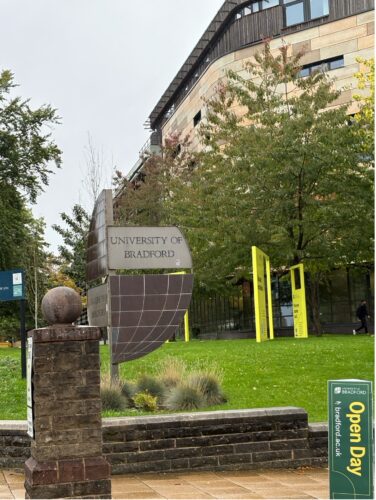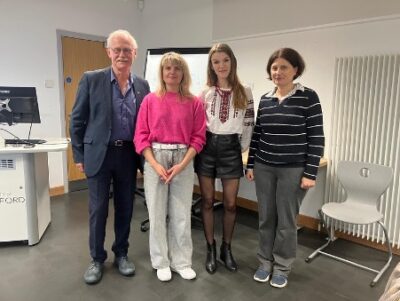At the invitation of Jean-Marc Trouille, Leader of the Jean Monnet Centre of Excellence and Network, on October 3, 2025, Associate Professor of the Department, Inna Koblianska, met with colleagues and students of the School of Management at the University of Bradford (United Kingdom).
During the meeting, attended by 17 participants, Inna presented the Department’s experience in implementing European projects under the Jean Monnet Actions programme, supported by the European Union. She introduced the current projects in detail: the module “Youth and Business: EU Practices for Cooperation” (101126538 — YouthBEU — ERASMUS-JMO-2023-HEI-TCH-RSCH, 2023–2026) and the Jean Monnet Chair “Strengthening EU Leadership and Capacity in Science and Innovation” (101175767 — EU_STRENGHTS — ERASMUS-JMO-2024-HEI-TCH-RSCH, 2024–2027).
As the head of the EU_STRENGHTS Chair, Inna Koblianska focused in particular on its objectives and the results achieved during the first year of implementation (2024–2025). These included the development of training courses, the organisation and delivery of project activities, as well as research outputs. Together with Jean-Marc Trouille, the opportunities for further cooperation in European studies and the integration of project results into the international educational environment were discussed.
The audience included 15 students of the European Business Management course from Germany, the UK, the USA, and Ukraine, who actively engaged in the discussion. The advice received from Jean-Marc Trouille on the development of future EU_STRENGHTS activities will serve as valuable guidance for the project’s next stages.
The projects “Youth and Business: EU Practices for Cooperation” (101126538 — YouthBEU — ERASMUS-JMO-2023-HEI-TCH-RSCH, 2023–2026) and “Strengthening EU Leadership and Capacity in Science and Innovation” (101175767 — EU_STRENGHTS — ERASMUS-JMO-2024-HEI-TCH-RSCH, 2024–2027) are funded by the European Union. Views and opinions expressed are however those of the author(s) only and do not necessarily reflect those of the European Union or the European Education and Culture Executive Agency (EACEA). Neither the European Union nor EACEA can be held responsible for them.


